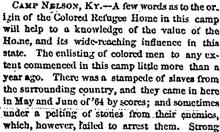Refugees Home in Kentucky.
For the Worcester Daily Spy.
CAMP NELSON, KY.––A few words as to the origin of the Colored Refugee Home in this camp will help to a knowledge of the value of the Home, and its wide-reaching influence in this state. The enlisting of colored men to any extent commenced in this camp little more than a year ago. There was a stampede of slaves from surrounding country, and they came in here in May and June of ’64 by scores; and sometimes under a pelting of stones from their enemies, which however, failed to arrest them. Strong efforts were made to prevent their enlistment. The subject was fairly laid before them Capt. Hall, their friend, well-known and trusted, and with a shout they chose to enlist. The protection of government to their families was promised them. Women and children came in during the summer and fall, looking to this spot, the centre of their hopes, with freedom guaranteed them. Probably full three hundred by November last, through many perils and much suffering, had congregated here. Here, aided by their friends, they were able to erect for themselves, in divers places, small cabins for a winter’s shelter, stored with a scanty supply for winter’s use. Diligent and unremitting labor led many to feel they could look forward to the coming cold without serious fear. Vain satisfaction! Rest was not for them. An order was issued for their expulsion from camp. It was executed on a bleak, biting day of winter, with the air thick with falling snow, by ruthless men, who tore down with jest their poor shelter over their heads appropriated to themselves whatever they chose of their hardly earned subsistence, and drove them forth–a helpless company–sick, cold and hungry. The solemn procession went by with cries and tears and anguished hearts that pierced the ear of a merciful God and called for retribution. Men with strong arms stood by, dressed in the uniform of the Federal soldier, saw the groups go wailing on, numbering their dearly loved, and were powerless to help. God saw and has not forgotten. Other men were on the alert. Slave masters, eager for the stray chattel, we’re swooping around, like some foul bird of prey, ready to pounce upon his hapless victim. An order soon came from the war department reversing this action and recalling of these people, not, however, till some died. Here, allow me to briefly narrate following: On a Saturday night, in an open shed, under a miserable roof, in Lexington almost under the shadow of Kentucky’s proud monument to her greatest statesman, were twelve or fourteen thinly clad and shivering creatures. Over a little fire made of a single stick of wood, for which they paid fifteen cents, they vainly strove for kindly warmth. The weary hours with increasing cold went dreamily by. In the morning a dead body lay in the midst of the freezing starving company. From their exposure many had implanted in their ill-protected frames the seeds of disease that ripened in after days, and swept off families. Out of such a great strait and need as this grew this Refugee Home in Camp Nelson, with the approval and order of the powers at Washington. The whole world will bless the humanity that brought it into life. In some respects it is unlike any other institution for freed people in the south. Originally designed as an asylum for the family of the colored soldier, it now receives by order of Gen. Palmer all women and children who come. Let it not be supposed, however that all men are refused admission. The old and decrepid are here that, have worn out their lives in the service of their master, and are now turned out to die. The blind, the lame and the foolish, and some able-bodied men we have. Yet the men are comparatively few that come. There are twenty-eight hundred names now on the records for whom ration are drawn, and the number is continually increasing. Upward of ten thousand rations are furnished them every five days. There are four wards erected, seventy-five feet by twenty-five, two of which are now used as a hospital, and two are occupied as dwellings. There is a dining hall also, one-hundred feet by thirty, with kitchen attached, and the various et ceteras for household work of a large establishment where hundreds are fed daily. Near one hundred cottages, of uniform structure, sixteen feet by thirty-two, containing two tenements each, together with about sixty tents, all laid out in streets, are filled with these people. Aside from these there are fifty cabins, built by those who occupy them. These are all kept neat, being white-washed, and have their little gardens attached. Some three or four hundred acres of land lying close by are under cultivation, the labor being chiefly performed by them women and children, the products of which are for their use. So you see, we have a large community having its peculiar features and organization. If not unlike others in many respects, it is most interesting to any one anxious for the progress of this oppressed race.
Lester Williams, Jr.
"Refugee Home in Kentucky," Worcester (MA) Spy, July 21, 1865, p. 2.

